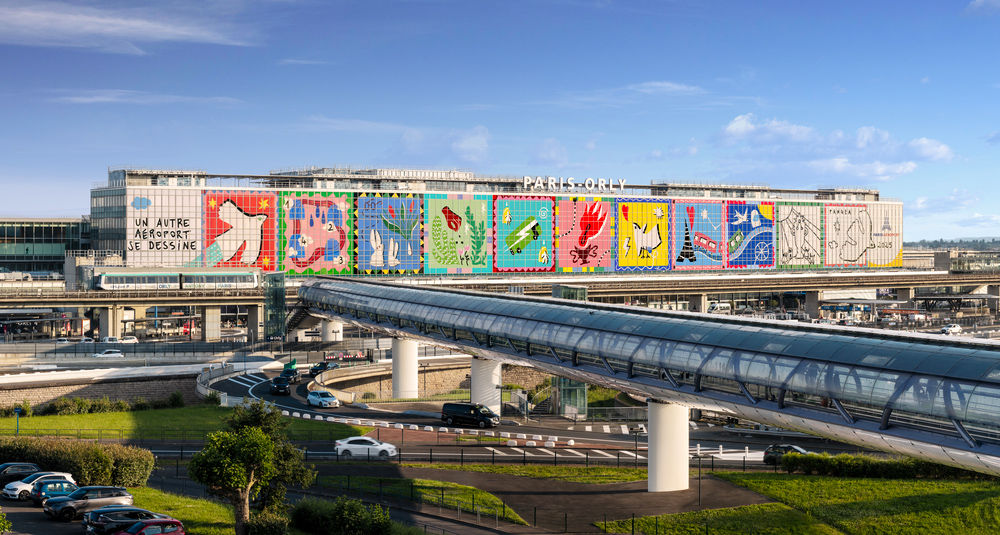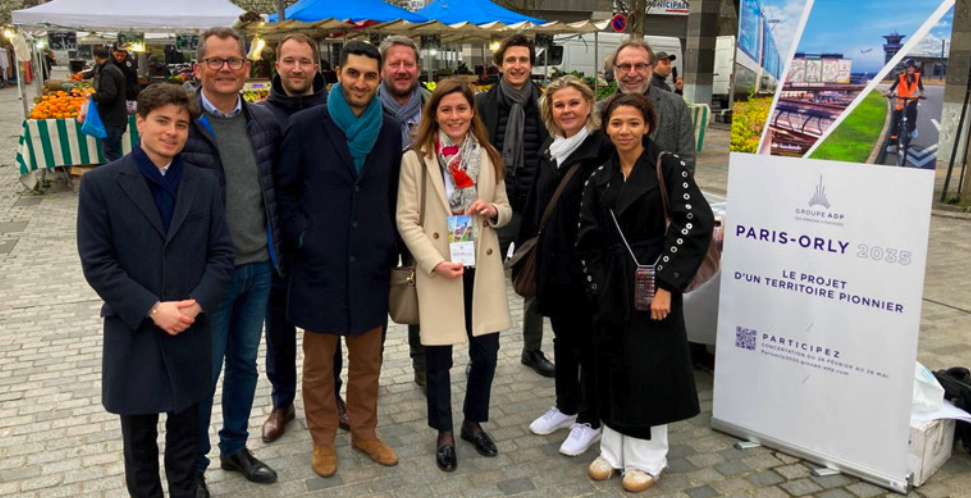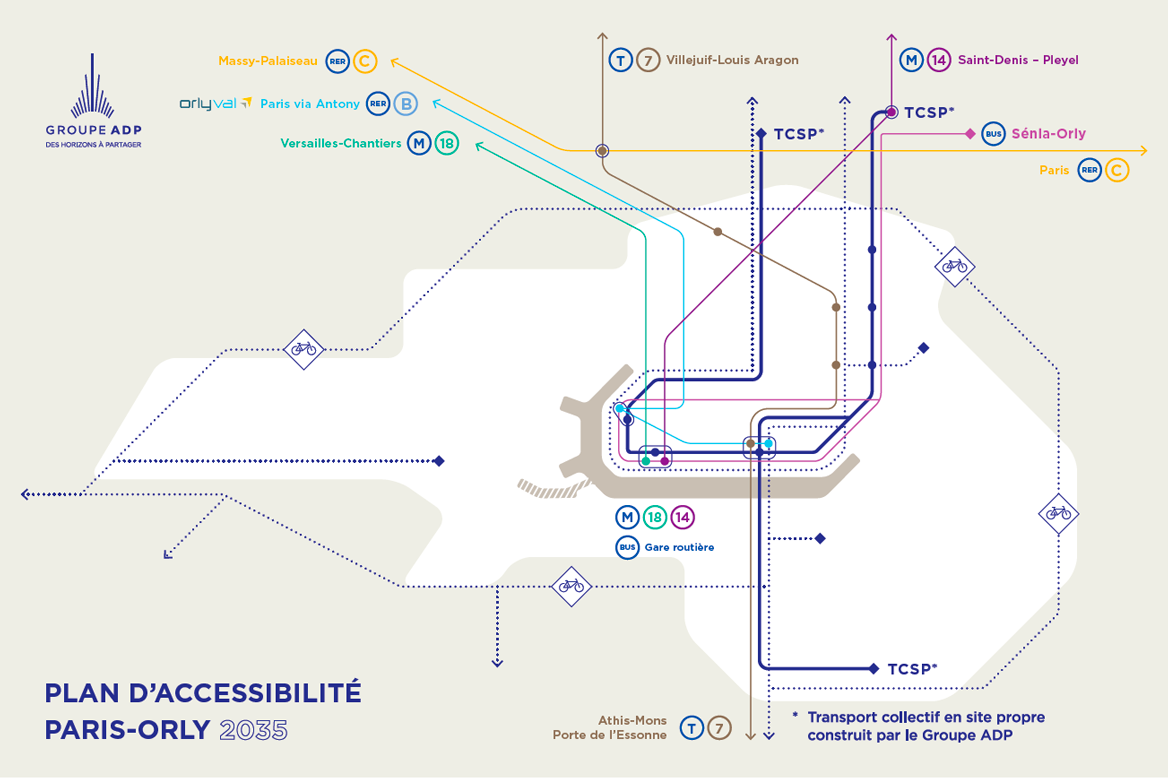Paris-Orly 2035: a pioneering airport
As one of the most urbanized airports in Europe, Paris-Orly Airport is particularly implicated in the climate challenge and its operations need to be examined as part of an ambitious, shared path to eco-mindedness. To speed its environmental transition, the Group initiated a large-scale, proactive public consultation process that led to the launch of the Paris-Orly 2035 project. The project marks a leap forward into the airport of the future.
A highly collaborative project
The Paris-Orly 2035 development project is the forerunner of a new airport model that combines decarbonization, quality of service and regional integration. With this project, Paris-Orly will be at the forefront of transforming the airport model for all the Group’s airports.

"Paris-Orly 2035 is the embodiment of a new airport model based on Groupe ADP’s environmental standards. With a strong focus on decarbonization, biodiversity and green innovation, it is the blueprint for a pioneering airport serving passengers, employees and nearby residents alike."
Groupe ADP chose to be proactive in consulting with the community. This process, which extended from February to May 2024, included public forums, topical workshops, neighborhood get-togethers and an online platform to give everyone the opportunity to share their views and contribute to the airport’s future. The opinions and input collected were analyzed as part of an overall assessment process, with its findings presented to the public at a meeting on October 8, 2024.
This consultative approach is consistent with the dialogue that Paris-Orly has maintained with all its stakeholders over several decades. Since 2023 the airport has drawn on an unprecedented initiative, the Paris-Orly environmental alliance, which brings together more than 50 of the airport’s businesses (airlines, security and janitorial service providers, car rental firms, hotels, etc.). The Paris-Orly environmental alliance has committed to a concrete action plan (see Note 1) that aims for a short-term transition to reduce the environmental impact of the airport’s various business activities. This mobilization is aligned with the airport’s path to decarbonization: Net Zero Emissions (ZEN) on the ground by 2030.

Strategic objectives for a pioneering sustainable airport
The Paris-Orly 2035 development project aims to accelerate the airport’s environmental transition by focusing on four areas:
- Access and mobility: ease congested access to the facility and reduce the role of passenger cars in favor of a clean public transport system. The project involves the creation of three parking lots and a drop-off lane at the airport entrances, about a kilometer away from the heart of the airport. A public transit system for airport use only has been commissioned, to serve the terminal and facilitate access to the various business hubs.
- Service and hospitality: enhance comfort for all passengers and employees, with a greater focus on the experience of persons with disabilities. To improve gate parking positions, the project will provide direct access to the aircraft via a jetway, and create a new boarding lounge, connected to Orly 2, so that six gates for boarding by shuttle bus can be converted for boarding via jetway.
- Zero-carbon energies: make greater use of low-carbon energies at the airport in connection with the entire ecosystem: multi-energy station, methanization and geothermal energy. The project also involves planting 900 trees and setting aside 30% of undeveloped land for biodiversity.
- Property development: attract job-creating businesses, relocate industrial activities to spur economic development across all of southern Greater Paris.
The public consultation process ended in October 2024, with a total of more than 10,000 voices heard!
As a result, the project has evolved to reflect the range of input received, including suggestions to incorporate the OrlyVal shuttle into the new public transit system, eliminate one of the four projected welcome centers, plan for new regional connections for cyclists, and more.

Transforming mobility: an integral part of the project
The Paris-Orly facility will model how the airport of the future can serve as a hub for mobility solutions. The arrival of Metro line 14 in June 2024 made a critical difference, allowing travelers to reach the center of Paris in 25 minutes; the Metro station at Orly 3 will welcome 95,000 travelers daily. With the arrival of Line 18 in 2027, Paris-Orly expects to double the number of passengers who travel to and from the airport via mass transit. These new forms of access represent a key milestone in transforming and decarbonizing the airport, since 40% of the airport's CO2 emissions on the ground are attributable to access by car.
Initial accomplishments already underway
To address the need for training in the regions surrounding the airport, the Paris-Orly campus will be opening its doors in October. The center will provide training in airport services and operations in partnership with the Faculté des Métiers de l'Essonne, preparing students for airline careers in ground-handling and customer services, sanitation services and support for people with reduced mobility.
In addition, a research chair on carbon capture in airports is currently being established in partnership with the Fondation Université Paris-Saclay. Researchers will be appointed in summer 2025 to begin work on carbon capture scenarios.
Paris-Orly 2035 by the numbers
The consultation process:
- 2 public hearings
- 6,000 people interviewed
- 104 participating municipalities
- 2,500 contributions
The project will:
- Increase the number of passengers using public transport from 40% to 60% (twice the level in 2019)
- Increase the number of employees using public transport from 30% to 40% (a fourfold increase from 2019)
- Install six kilometers of new bike lanes between 2024 and 2030
- Stabilize changes in aircraft operations for a managed increase in the number of passengers processed of about 16% by 2035 versus 2023 levels
(1) The Paris-Orly environmental alliance is committed to five quantified commitments for 2030: Zero net emissions (ZEN) on the ground by 2030 at Paris-Orly; 30% of land area set aside for biodiversity; noise reduction of 6 decibels in late evening hours; a 40% reduction in electricity consumption by 2030 in the air terminals; 80% of non-hazardous waste recovered by 2030.
